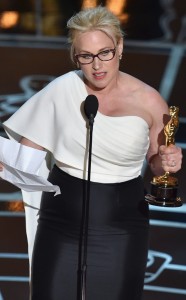 Last night, the Oscars took a turn into the political realm. From Neil Patrick Harris’ jab at the lack of diversity to John Legend & Common’s acceptance speech, celebs were making bold statements. However, there was one actor whose speech stood out among the rest.
Last night, the Oscars took a turn into the political realm. From Neil Patrick Harris’ jab at the lack of diversity to John Legend & Common’s acceptance speech, celebs were making bold statements. However, there was one actor whose speech stood out among the rest.
When Patricia Arquette highlighted the unequal pay and rights among women, supporters such as Meryl Streep & Jennifer Lopez visibly showed their solidarity. Women nationwide could have applauded her efforts of bringing income inequality to the forefront of public conversation. The only problem?
Arquette marginalized gay, trans and women of color.
During a press room interview, she made it clear that “it’s time for… all the gay people and all the people of color that we’ve all fought for to fight for us now.”
Whether she intended to or not, her thoughts opened up a can of worms that depicts two larger issues within mainstream feminist theory: the notion that all women share the same experiences AND the undertones of “I Am Savior.” Not only are these lines of thought dangerous to the validity of feminism, but they invalidate the varying experiences of women who are not white, middle-class women.
Gay, trans and women of color earn far less than their white counterparts. For every dollar that a white man makes, white women make 78 cents to the dollar, followed by black women with 64 cents, Native American women with 59 cents and Latinx women at 54 cents. While income equality is a very real problem in the US, Arquette’s net worth sits somewhere between 24 and 25 million dollars, far more than $49,398, the average yearly earnings of American women. Mentioning the need for a living wage would also been a step in the right direction.
As well-intended as Arquette’s answers aimed to be, the “I Am Savior” sentiment reared its ugly head. Throughout history, women of color, gay and trans women didn’t have the luxury of focusing strictly on women’s issues. To say that mainstream feminists have fought for the rights of marginalized women is woefully inaccurate. If that were the case, there would only be ONE feminist theory, not multiple highlighting the need for inclusivity. The “we helped you through your issues, so you should return the favor” undertone only serves to pin marginalized groups against mainstream feminism. Nothing about the way Arquette worded that line shows solidarity within the community of women.
Until we can include the voices of all women, I will respectfully hold my applause.
